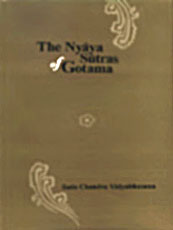 Nyaya Philosophy has sixteen categories, dealing with the means to understand the universe. The Nyaya School of philosophical speculation is based on texts known as the Nyaya Sutras, which were written by Aksapada Gautama, from approximately the 2nd century B.C. Ignorance bars the way to liberation. Transcendental knowledge of our True Self is Liberation, end of cycle of birth and death, and freedom from misery. Man can be liberated from the life-death cycle, only by deep logical analysis based on philosophical knowledge and dissolution of doubt and ignorance. The most important contribution made by the Nyaya School to modern Hindu thought is its methodology, based on a system of logic.
Nyaya Philosophy has sixteen categories, dealing with the means to understand the universe. The Nyaya School of philosophical speculation is based on texts known as the Nyaya Sutras, which were written by Aksapada Gautama, from approximately the 2nd century B.C. Ignorance bars the way to liberation. Transcendental knowledge of our True Self is Liberation, end of cycle of birth and death, and freedom from misery. Man can be liberated from the life-death cycle, only by deep logical analysis based on philosophical knowledge and dissolution of doubt and ignorance. The most important contribution made by the Nyaya School to modern Hindu thought is its methodology, based on a system of logic.
Nyaya Philosophy is based on: Pramana -Means to acquire knowledge, Prameya - Object of knowledge, Samshaya - Doubt, Prayojana - Purpose, Dristanta - Illustrative example, Siddhanta - Conclusion, Avayava - Constituents of a syllogism, Tarka - Hypothetical argument, Nirnaya - Ascertaining the truth, Vada - Discussion, Jalpa - Disputation, Vitanda - Refutation, Hetvabhasa - Fallacy in the cause, Chala - guile, Jati - casuistry and Nigrasthana- Vulnerable point of opponent`s statement. Nyaya Philosophy believes in the existence of a supreme God who initiates the process of world creation.
Theory of inference in Nyaya philosophy
The methodology of inference involves a combination of induction and deduction by moving from particular to particular, via generality. It has five steps.
Theory of causation in Nyaya philosophy
A cause is outlined as an unconditional and invariable antecedent of an effect and an effect as an unconditional and invariable consequent of a cause. The same cause produces the same effect; and the same effect is produced by the same cause.
Theory of God in Nyaya philosophy
Early Naiyayikas (Nyaya scholars) wrote very little about God, i.e., Ishvara (literally, the Supreme Lord). However, later Buddhists in India had turned into strict atheists from agnostics. As a reaction, the later Naiyayikas entered into conflicts with the Buddhists and tried to establish the existence of God through logic.
Theory of mono-theism in Nyaya philosophy
The Naiyanikas have stated an argument that God can only be one. In Nyaya Kusumanjali, this is discussed against the proposition of the Mimamsa School.
Final bliss arises from the knowledge of the truth which is established as a particular tenet of the Nyaya School. The subjects discussed in the Nyaya Sastra are sixteen in number, and they are categorically stated in the first maxim of the book. They are Pramana, Prameya, Sansaya, Prayajana, Drishta Vedanta, Siddha Vedanta, Avayava, Tarka, Mrnaya, Yada, Jalpa, Yitanda, Hetwabhasa, Chhala, Jati and Nirgahastana.












